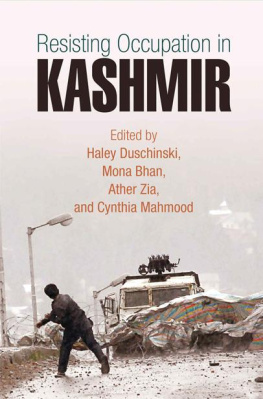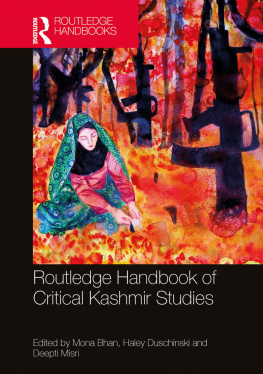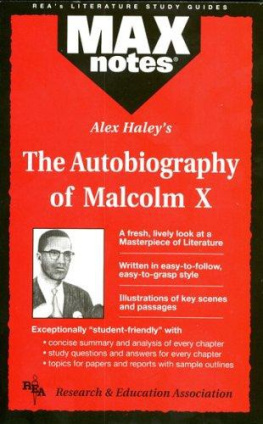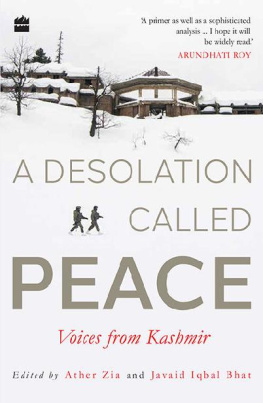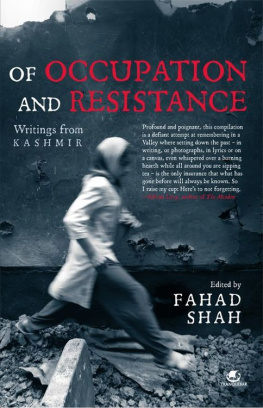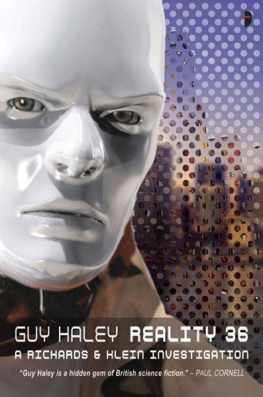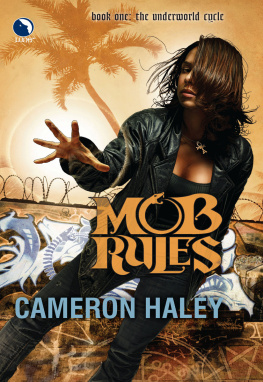Haley Duschinski Mona Bhan Ather Zia - Resisting Occupation in Kashmir
Here you can read online Haley Duschinski Mona Bhan Ather Zia - Resisting Occupation in Kashmir full text of the book (entire story) in english for free. Download pdf and epub, get meaning, cover and reviews about this ebook. year: 2018, publisher: University of Pennsylvania Press, genre: Politics. Description of the work, (preface) as well as reviews are available. Best literature library LitArk.com created for fans of good reading and offers a wide selection of genres:
Romance novel
Science fiction
Adventure
Detective
Science
History
Home and family
Prose
Art
Politics
Computer
Non-fiction
Religion
Business
Children
Humor
Choose a favorite category and find really read worthwhile books. Enjoy immersion in the world of imagination, feel the emotions of the characters or learn something new for yourself, make an fascinating discovery.
- Book:Resisting Occupation in Kashmir
- Author:
- Publisher:University of Pennsylvania Press
- Genre:
- Year:2018
- Rating:4 / 5
- Favourites:Add to favourites
- Your mark:
- 80
- 1
- 2
- 3
- 4
- 5
Resisting Occupation in Kashmir: summary, description and annotation
We offer to read an annotation, description, summary or preface (depends on what the author of the book "Resisting Occupation in Kashmir" wrote himself). If you haven't found the necessary information about the book — write in the comments, we will try to find it.
Resisting Occupation in Kashmir — read online for free the complete book (whole text) full work
Below is the text of the book, divided by pages. System saving the place of the last page read, allows you to conveniently read the book "Resisting Occupation in Kashmir" online for free, without having to search again every time where you left off. Put a bookmark, and you can go to the page where you finished reading at any time.
Font size:
Interval:
Bookmark:
Resisting Occupation in Kashmir
THE ETHNOGRAPHY OF POLITICAL VIOLENCE
Tobias Kelly, Series Editor
A complete list of books in the series is available from the publisher.
RESISTING OCCUPATION IN KASHMIR

Edited by
Haley Duschinski, Mona Bhan,
Ather Zia, and Cynthia Mahmood

UNIVERSITY OF PENNSYLVANIA PRESS
PHILADELPHIA
Copyright 2018 University of Pennsylvania Press
All rights reserved. Except for brief quotations used for purposes of review or scholarly citation, none of this book may be reproduced in any form by any means without written permission from the publisher.
Published by
University of Pennsylvania Press
Philadelphia, Pennsylvania 19104-4112
www.upenn.edu/pennpress
Printed in the United States of America on acid-free paper
10 9 8 7 6 5 4 3 2 1
A catalogue record for this book is available from the Library of Congress.
ISBN 978-0-8122-4978-1
CONTENTS

Mona Bhan, Haley Duschinski, and Ather Zia
Haley Duschinski and Bruce Hoffman
Mona Bhan
Ather Zia
Saiba Varma
Seema Kazi
Gowhar Fazili
Ershad Mahmud
Farrukh Faheem
Mohamad Junaid
Cynthia Mahmood
INTRODUCTION

Rebels of the Streets
Violence, Protest, and Freedom in Kashmir
MONA BHAN, HALEY DUSCHINSKI, AND ATHER ZIA
Im the rebel of the streets that been eulogized in blood
Dramatized in politics duly hated with no love
Demonized in the news with their fabricated tales
While sodomized young kids are still screaming in their jails
Lost and never found in this facade of peace
Reflected in thoughts, that Dajjal now breathes
He speaks to his puppets and silhoets now tremble
Cause the brave men are dead and all cowards resemble
Satans evil empire is reaching out to hold thee
Since money can buy out your political theory
And your unborn child, is raised as a traitor
Livin on blood money and he doubts his Creator
Misleaded by his greed till his soul starts to blacken
And he sees his own face in the signs of Armageddon
And this earth will shake cause of the crimes he did
His bones will break holdin the coffin of his Kid
They gave us blood and hate then wondered why we all are rebels
In the Land of Saints each man raised is called a rebel
MC Kash, Why We Rebels
Rebel of the streets: These powerful lyrics by Kashmiri rapper MC Kash reflect a new phase in the politics of dissent in Kashmir, shaped by a longstanding popular struggle against Indias brutal military occupation that has dominated the cultural, social, and political landscape of the region for decades. Since Indias independence from British colonial rule and the subsequent partition in 1947, India and Pakistan, both of which claim sovereign control over the region, have fought four inconclusive wars over Kashmir. In Indian-administered Kashmir, a series of forced, rigged, and illegitimate elections have installed what MC Kash refers to as puppet regimes that have constrained expressions of peoples will for Kashmirs political resolution while completely ignoring a series of United Nations (UN) resolutions for a free and fair plebiscite to settle the Kashmir dispute. Reinforced by Indian militarys ubiquitous presence in Kashmir, the locally elected governments have turned Kashmir into a late modern colonial occupation in which state violence is obscured and justified through claims of humanitarianism premised on principles of democracy, good governance, development, and rule of law (Mbembe 2003, 2530).
In 1989 Kashmiris, long resistant to Indian rule in their homeland, launched a popular armed rebellion against the Indian state. India sought to crush the rebellion through a massive counterinsurgency assault against insurgent and civilian populations, deploying more than 700,000 military and paramilitary forces in the region. More than 25 years later this counterinsurgency regime remains, producing a perpetual state of siege that subjects the entire population to everyday conditions of surveillance, punishment, and control. With a population of approximately 12.5 million, Jammu and Kashmir has 1 soldier for every 17 Kashmiris, making it one of the most densely militarized zones in the world (International Peoples Tribunal on Human Rights and Justice in Indian-Administered Kashmir and Association of Parents of Disappeared Persons 2015).unknown and unmarked graves and mass graves in Kashmir (International Peoples Tribunal on Human Rights and Justice in Indian-Administered Kashmir and Association of Parents of Disappeared Persons 2015).
The armed rebellion transformed into a new mode of resistance in the first decade of the twenty-first century, with widespread anti-India street protests marking the beginning of a new intifada (Kak 2011). Clashes between youth protesters and state armed forces escalated in the summer of 2010, with Indian state armed forces killing 120 civilians, a period marked in Kashmiri consciousness as the year of killing youth (Bukhari 2010).
Kashmiris have consistently challengedboth through armed and unarmed resistancewidespread attempts by sections of the Indian media, academia, and civil society to frame Indias brutal military occupation as a democracy. In one example, in 2013 the state government hosted the Zubin-Mehta-led Bavarian State Orchestra for a program titled Ehsaas-e-Kashmir (Feeling for Kashmir). Organized by the German embassy, this event aimed to reach the hearts of the Kashmiris with a message of hope and encouragement (see Bukhari 2013). Kashmiri civil society and profreedom groups opposed the event on the grounds that it provided a platform for the state to obfuscate the occupation and appropriate the traumatic narrative of violent tragedies that had befallen Kashmiris. In protest, civil society groups organized a street concert called Haqeeqat-e-Kashmir (Reality of Kashmir) to showcase peoples memories of the occupation through art and music.
Cultural productions such as MC Kashs music, Haqeeqat-e-Kashmir, and the many forms of literary and artistic expression emerging from Kashmir today perform important political and historic work. They build critical consciousness among Kashmiris about radically new approaches to writing history so that the states efforts to silence alternative narratives of Kashmirs long and complex history of occupation, in which only hegemonic forms of history and memory were allowed to thrive, can be countered. Such popular and expressive culture(s) of resistance are deeply political and provide a rich ethnographic window to track and understand the multiple logics of occupation (Visweswaran 2013, 3). At the same time, new forms of protest in Kashmir exceed their political framing and outcomes and force consideration of the ways in which cultural expressions work as forms of memory making, enabling a reclamation of lost histories while also empowering a younger generation of Kashmiris to defy state-scripted formations of Kashmiri political and cultural identities. At once creative and generative, cultural productions, which combine local and nonlocal elements from music, art, film, and literature, forge a larger culture of resistance in which poetry as much as politics provides tools to mourn death, celebrate Kashmiri martyrdom, and energize the fight against Indias occupation of Kashmir (see Faheem, this volume; Kaul 2015).
Next pageFont size:
Interval:
Bookmark:
Similar books «Resisting Occupation in Kashmir»
Look at similar books to Resisting Occupation in Kashmir. We have selected literature similar in name and meaning in the hope of providing readers with more options to find new, interesting, not yet read works.
Discussion, reviews of the book Resisting Occupation in Kashmir and just readers' own opinions. Leave your comments, write what you think about the work, its meaning or the main characters. Specify what exactly you liked and what you didn't like, and why you think so.

